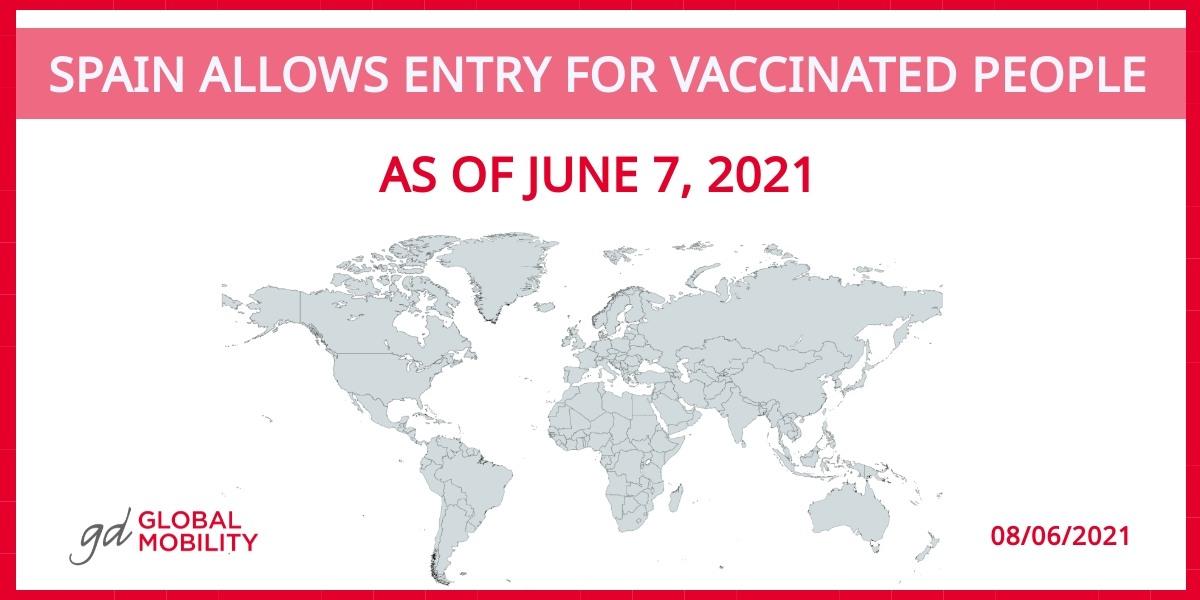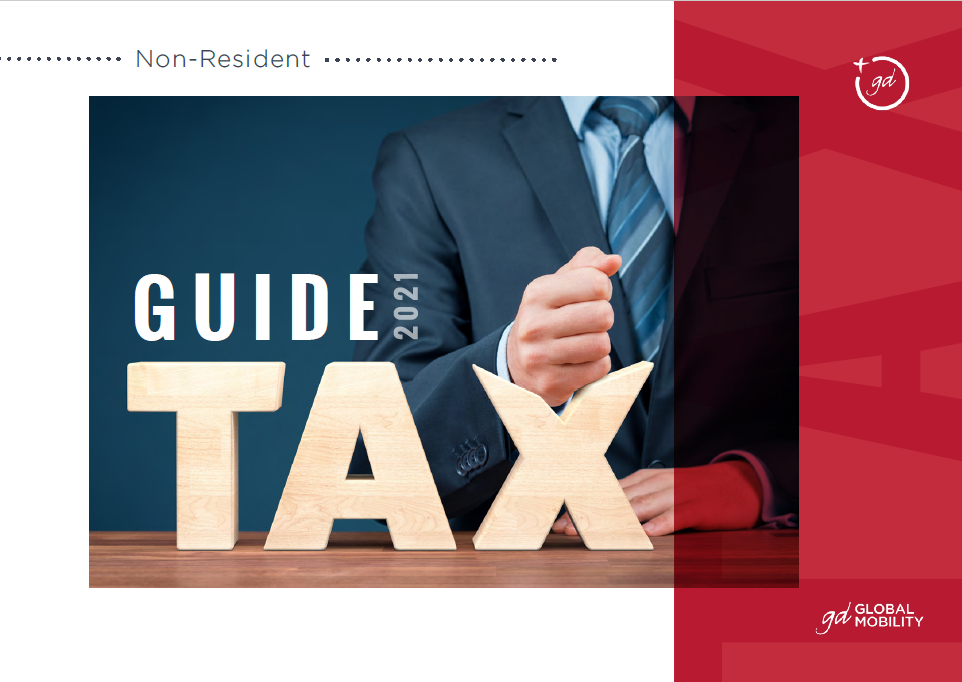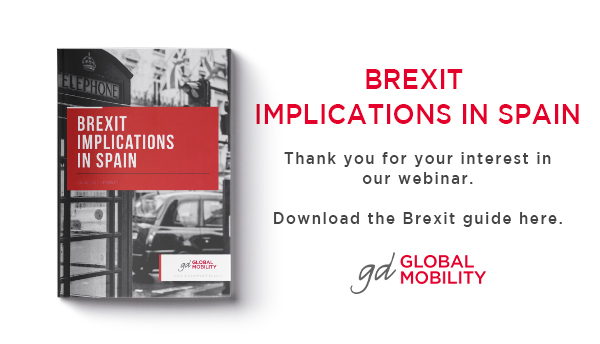
In this post we will explain to you the current situation concerning borders and restrictions when entering Spain. This information will be of interest to you if you want to travel or, for example, create a business in Spain.
First of all, you must take into account two important dates; both affect the opening of borders in Spain:
- June 7, 2021 (international scope): Internationally, all vaccinated people, regardless of where they come from, can enter Spain as of June 7.
- July 1, 2021 (EU scope): The EU COVID Digital Certificate comes into force, with which you can travel within the European Union after having been vaccinated, showing a negative PCR test or demonstrating that the disease has passed.
This content is for informational purposes only. Both the restrictions and the regulations may vary depending on the epidemiological situation at any point in time.
GD Global Mobility advises companies, individuals, and investors on international mobility issues. For more information, get in touch with our professionals who specialize in international mobility management and advisory services.
Restrictions for traveling to Spain
The closing or opening of borders and the possibility of traveling to Spain has been modified according to the recommendations of the European Union, as well as the epidemiological situation of each international country. In Spain, this topic is currently regulated by Order INT 657/2020, of July 17, 2020, which has been modified and updated every 15/30 days.
Opening of borders in Spain in summer
Who can enter Spain?
- Residents hailing from Albania, Australia, New Zealand, Singapore, Rwanda, South Korea, Thailand, China, Israel, Lebanon, the United Kingdom, Republic of North Macedonia, Serbia, Japan, United States, Taiwan, and the administrative regions of Macao and Hong Kong. In other words, residents who come from these countries are exempt from travel restrictions to Spain. That is, as long as they come directly from these countries, have traveled exclusively through others on this list, or have only carried out international transits at airports located in countries other than those on this list (this list is being modified based on the recommendations of the EU, so it is advisable to pay attention to the countries that are added and/or taken off this list).
- Regular residents of the European Union, Schengen Associated States, Andorra, Monaco, The Vatican (Holy See), or San Marino, who go to that country, proving it with documentation.
- Those who are holders of a long-stay visa issued by a Member State or Schengen Associated State who are going to that country.
- Health professionals, including health researchers, and elderly care professionals on the way to or from work.
- Transportation personnel, seafarers, and aeronautical personnel needed to carry out activities related to airspace.
- Diplomatic, consular, military, and civil protection personnel, and members of international and humanitarian organizations, in the exercise of their functions.
- Students who undertake their studies in the Member States or Schengen Associated States and who have a permit or visa for long-term stay, provided that they go to the country where they study, and that entry occurs during the academic year or the 15 days prior to it starting. If the duration of the trip is for less than 90 days, it must be proven that the studies are carried out in an official center in Spain (new from June 7, 2021).
- Highly qualified workers whose work is necessary and cannot be postponed or carried out remotely, including participants in high-level sports events that take place in Spain. These circumstances must be justified by documentary evidence.
- People traveling for imperative family reasons, which are duly accredited.
- People who can prove reasons of force majeure, necessity, or whose entry is allowed for humanitarian reasons.
- People with a vaccination certificate that the Ministry of Health recognizes for this purpose, after verification by the health authorities, as well as minors who are accompanying them who the Ministry of Health have also recognized (new from June 7, 2021). We will develop this point later; it is one of the most anticipated measures in the field of international mobility.
Any person who does not belong to one of the above groups will be denied entry into Spain. In addition, entry may also be denied to any national of a third country (outside the EU) who does not comply with the health control requirements for COVID-19 even if they belong to one of the groups mentioned above.
In the case of people arriving at any airport in Spain, with or without intermediate stopovers, on flights from airports located in third countries, who are subject to quarantine* by Order of the Ministry of Health, while that order is in force:
- only exceptions 5, 6, and 10 detailed above will apply;
- except in the case of persons residing in Spain or Andorra, or spouses of Spanish citizens or couples who maintain a union similar to a conjugal union and are registered in a public registry, or those ascendants and descendants who live in their care, provided that they travel with or go to meet with that Spanish citizen.
* At the moment affecting travelers from Brazil, India, and South Africa.
In addition, from June 7 and until further notice there are also developments in relation to the documentary and health controls to be carried out at Spanish airports or ports.
Health check form for entering Spain
Travelers arriving in Spanish territory by air or sea, including those who come in transit to other countries, must complete a health check form before departure (available here). Once the form has been filled in, a QR code will be generated that the traveler must present to the transport companies just before boarding.
Health check for entering Spain
Travelers arriving in Spain as their final destination must undergo a health check upon arrival at their first point of entry. What does this check consist of? At least:
- a routine temperature measurement in order to identify travelers who have a fever (37.5 °C);
- a documentary check in relation to the information provided by travelers as a declaration of responsibility on the health control form through SpTH;
- and a visual check on the status of the passenger.
In addition, in relation to health controls in Spain, travelers coming from countries or areas at risk are required to provide certification of one of the following health requirements: certificate of vaccination, diagnosis, or recovery.
Children under 6 years of age are not required to submit any of these three certificates. However, they must still have the QR code given to them once they complete the health check form.
Vaccination certificate for entering Spain
This is a certificate confirming that the traveler has been vaccinated against COVID-19. This certificate must include the date of the dose (the complete schedule must have been finished at least 14 days before), the agency that vaccinated the traveler, their personal data, as well as the type of vaccine, since only those that have been approved by the EMA or WHO are allowed.
Negative COVID test for entering Spain
You can also choose to present a diagnostic certificate that indicates the result of a Diagnostic Test for Active COVID-19 Infection that the traveler has performed.
In relation to the presentation of the negative test for COVID-19, there are two interesting developments since June 7, 2021:
- Antigen tests are now accepted for showing negative tests as long as they have the approval of the European Commission
- Diagnostic test certificates for active COVID-19 infection with a negative result issued in the 48 hours prior to arrival in Spain are accepted as valid (previously set at 72 hours)
What should the diagnostic certificate include? Name and surname of the holder, the day the sample was taken, the type of test carried out, and the issuing country.
Recovery certificate for entering Spain
This is a certificate that confirms that the traveler has recovered from COVID-19 and that therefore the disease has passed. Recovery certificates issued by the competent authority or by a doctor are accepted as valid at least 11 days after the first positive diagnostic test has been performed. The validity of the certificate will end 180 days from the date the sample was taken.
This certificate must include: name and surname of the holder, the date of taking the sample of the first positive diagnostic test for SARS-CoV-2, the type of NAAT test performed, and the issuing country.
Important: the certificates are only required for those travelers who come from countries or areas of risk. You can check the list of countries at the end of this post. Do you want to know more? Click here
That is, if you come from a country or area of risk, it is no longer mandatory to prove a negative PCR test (as it was before June 7, 2021); instead you have the option of showing any of the three certificates discussed above (and which, by the way, must be in Spanish, English, French, German, or translated by an official body if the original is in another language).
Until the European Union Digital COVID Certificate is launched (mentioned at the beginning of this post where we indicated the two key dates in relation to borders), people who come from risk areas, and who therefore require one of the three certificates mentioned above, must go through the “documentary check” (a slower control point). Other travelers will be able to go through the so-called “fast control”.
Opening of land borders in Spain
People 6 years of age or older, from countries or areas of risk, who arrive in Spain by land, must have one of the three certificates mentioned above. The following are exempt from this requirement:
- Land transport professionals in the exercise of their professional activity.
- Cross-border workers.
- Residents in border areas, within a radius of 30 km of their place of residence.
List of countries or areas of risk
Countries or areas of risk from which at least one of the three above-mentioned certificates is required:
- In Europe: Belgium (except the Vlaams Gewest region), Cyprus, Denmark (except Midtjylland, Sjælland and Syddanmark regions), Slovenia (except the Vzhodna Slovenija region), France (except the regions of Bourgogne-Franche-Comté, Bretagne, Center - Val de Loire, Corse, Grand Est, Hauts-de-France, Martinique, Mayotte, Normandie, Nouvelle-Aquitaine, Occitanie, Pays de la Loire and Provence-AlpesCôte d’Azur), Greece (except the regions of Anatoliki Makedonia-Thrakim, Dytiki Ellada, Ionia Nisia, Ipeiros, Kentriki Makedonia, Kriti, Notio Aigaio, Peloponnisos, Sterea Ellada, Thessalia and Voreio Aigaio), Ireland, Italy (except the regions of Abruzzo, Campania, Emilia-Romagna, FriuliVenezia-Giulia, Lazio, Liguria, Lombardia, Marche, Molise, Piemonte, Province Autonoma di Bolzano / Bozen, Autonomous Province of Trento, Puglia, Sardegna, Tuscany, Umbria, Valle d’Aosta / Vallée d’Aoste and Veneto), Latvia Liechtenstein, Norway (except Innlandet, Møre og Romsdal, Nordland, Troms og Finnmark, Trøndelag, Vestfold og Telemark, Vestland and Viken), Netherlands (except Friesland (NL) and Groningen regions), Portugal (except the autonomous region of Madeira) and Sweden (except Mellersta Norrland and Stockholm regions)
- The rest of the world: all countries except Albania, Australia, China, South Korea, United States of America, Israel, Japan, Lebanon, New Zealand, United Kingdom of Great Britain e North Ireland, Republic of North Macedonia, Rwanda, Serbia, Singapore, Swiss, Thailand and Taiwan.




